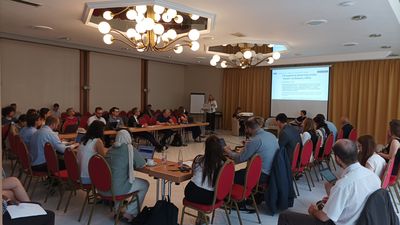
Date: 25 June 2024, 9-15:40
Venue: Budapest room, Hotel Benczur, Budapest, Hungary
Chairperson: Alexa Botár, NSC-FoE Hungary (MTVSZ), co-moderators of panels: Seda Orhan and Kasia Ugryn, CAN Europe
PROGRAM - downloadable pdf. See downloadable presentations below, built in the program.
8:30 – 8:55 Registration, welcome coffee
9:00 – 9:15 Opening – Mátyás Maksi, Deputy Head of Representation, European Commission Representation in Hungary
9:15 – 9:30 Welcome address – Robert Zeßner, Head of Economic Unit, Embassy of the Federal Republic of Germany to Hungary
9:30 – 11:00 Panel 1: Advantages and benefits of adequate climate action – how can climate policy work for the people?
Speakers:
- Dr. Barbara Botos, Hungary’s Ambassador at Large for Climate: The international and European mitigation and adaptation framework
- Dana Marekova, Co-Founder and Coordinator of Climate Coalition Slovakia: How (not) to talk about benefits of climate action in CEE?
Panel discussion with moderated Q&A with participants. Short oral contribution on CAN Europe’s Co-benefits report by Kasia Ugryn, CAN Europe
11:00 – 11:30 Coffee break
11:30 – 13:00 Panel 2: Between NECPs to Social Climate Plans – how to enhance governance and ownership in well-targeted planning?
By the end of June 2024, the EU Member States are supposed to deliver their final updated NECPs, and in December the European Commission is expected to release its final overall assessment of these plans – that will build a guide towards the crucial 2030 milestone. In parallel there is an obligation to draft the Social Climate Plans by mid-2025 that should be aligned with the NECPs but also to analyse much deeper the social needs to be addressed to ensure a proper protection of the groups (potentially) most affected by the energy and / or transport poverty, and also create mechanism for a just distribution.
What governance principles, methods and participatory processes ensure that SCPs are designed to benefit the most vulnerable ones?
How can the NECP update process feed into the SCP planning process? What are the lessons learned from the NECP drafting process? How to build a coherent link between climate&energy and social polices?
Speakers:
- Viktor Horváth, Deputy State Secretary for Energy Transition, Ministry for Energy: The Hungarian NECP
- Štěpán Vizi, Climate policy Expert, Centre for Transport and Energy (CDE), Czechia: Lessons learned and recommendations from the NECP and SCP drafting processes in Czechia
Panel discussion with moderated Q&A with participants. Short oral contribution on the NGO aspects of the Social Climate Plan by Jakub Sokołowski, Researcher, Institute for Structural Research, Poland
13:00 – 13:45 Lunch
13:45 – 15:15 Panel 3: Renewables for the Citizens in the CEE: Future of the Electricity Markets and Infrastructure
Speakers:
- Jenő Berda, Head of Electricity Infrastructure Unit, Ministry of Energy, Hungary: Status and regulation of distributed electricity production, challenges and goals
- Marta Anczewska, Energy Policy Coordinator, Climate Action Network Europe: Overview of new EU regulations regarding energy markets (latest Market Design reform), and recommendations for the implementation, with special focus on grids development
Panel discussion with moderated Q&A with participants. Short oral contribution on the V4 community energy aspects by Bence Kovács, community energy expert, NSC-FoE Hungary
15:15 – 15:40 Conclusions, closing








